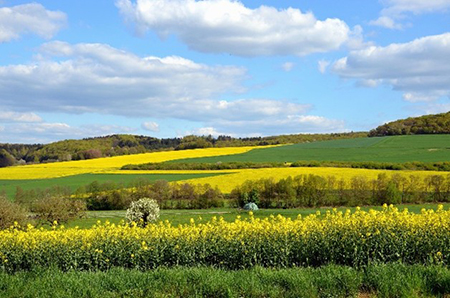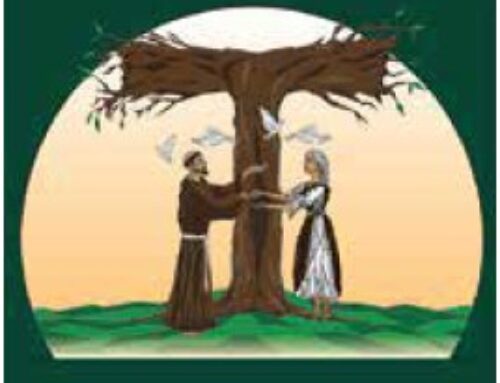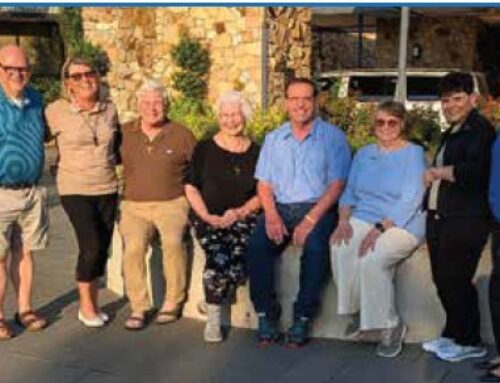(This article originally appeared in the TAU-USA Spring 2025 Issue #115)
Sister Mother Earth – Canticle of Creatures Reflections Part 1
Praised be You, my Lord, through our Sister Mother Earth,
who sustains and governs us,
and who produces various fruit with colored flowers and herbs.
Sister Mother Earth
by Bret Thoman, OFS
 St. Francis composed his masterful prayer-poem, Canticle of the Creatures, in the Umbrian dialect 800 years ago. He was staying alongside the church of San Damiano to be close to St. Clare. Aged and infirm and nearly blind, he dictated it to one of his friars, “seeing” through the inner eye of his mind.
St. Francis composed his masterful prayer-poem, Canticle of the Creatures, in the Umbrian dialect 800 years ago. He was staying alongside the church of San Damiano to be close to St. Clare. Aged and infirm and nearly blind, he dictated it to one of his friars, “seeing” through the inner eye of his mind.
As anyone who has ever been to Assisi will undoubtedly agree, there, in the seraphic city, it feels natural to praise God for his wondrous creation. It appears that God had something particularly special in mind when he created the majestic Umbrian Mountains and the vast Spoleto Valley.
Hence, we may assume it was easy for St. Francis to gaze at God’s beautiful creation, feel a kinship with all created things, and pine to praise the Lord for Sister Mother Earth. Yet, the Canticle is rich in meaning. Indeed, St. Francis is more than the “birdbath saint.”
Francis never praises God’s works of creation; rather, he praises God the Creator per, or through, his works. When Francis looked at creation, he saw the Creator. Thomas of Celano emphasized this point: “In art he praises the Artist; whatever he discovers in creatures he guides to the Creator. He rejoices in all the works of the Lord’s hands, and through their delightful display he gazes on their life-giving reason and cause.” (Second Life, Chapter 124, 165).
Francis believed that all creation was good. For those of us informed by the Genesis creation narrative, this seems evident. (See Genesis 1:31). Yet, Francis’ era was rife with dualistic worldviews. Many groups in that milieu, such as the Cathars, asserted that only the “Spirit” was good, while the “material world” was corrupt.
Moreover, Francis’ relationship toward the created world differed from that of many who adhered to the Catholic faith. Yes, God confers dominion to man over all animals (see Genesis 1:26; 28). However, many have misunderstood this word as “domination.” They used it as an excuse to lord themselves over creation as masters and not safeguard it as stewards.
St. Francis, instead, perceived his relationship with the created world as fraternal. St. Bonaventure described it in this way: “From a reflection on the primary source of all things, filled with even more abundant piety, he would call creatures, no matter how small, by the name of ‘brother’ or ‘sister,’ because he knew they shared with him the same beginning” (Major Legend, Chapter 8, 6).
Thus, these words flowed easily from his heart and mind. This stanza is the last of those dedicated to the “elements,” that is, fire, air, water, and earth. Since antiquity, these four elements were believed to comprise the fundamental building blocks of all matter. In a sense, this stanza is the most notable, since the earth represents solidity and stability. Indeed, Francis sees the earth not just as “sister”—in Italian, a gendered language, the word for earth is terra, which is feminine—he sees the land as his “mother.” For it is the land that “sustains and governs.”
These few words reveal how Francis trusted in the Providence of God working through the earth. It suggests a docile, fraternal, and filial trust in God. St. Francis—ever the poet and troubadour—recognizes the beauty of creation. Indeed, the earth “produces various fruit with colored flowers and herbs.”
Alas, the Canticle of Creatures is a prayer more from the heart than the head. St. Francis’ theology was, first and foremost, lived—and lived with the love of Christ profoundly immersed in his heart. May we, too, like St. Francis and the Psalmist, sing out to God, “Let [all creation] praise the Lord’s name, for his name alone is exalted, His majesty above earth and heaven.” (Psalm 148:13)



Leave A Comment